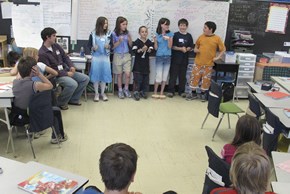BY TAMARA BELKOV
Miss Young's class is literally hopping. The happy frog music
comes on and the boys and girls all jump to their feet to
bounce to the techno beat. The school day was done, and Young,
a Grade 5/6 teacher at Cyril Varney Public School, had promised
students a bit of musical mayhem as a reward for their
respectful behaviour during a visit from two special guests.
The 24 students had welcomed Lise Denis from the Social
Planning Council and Keith Brewster into their classroom and
into their world.
Denis co-ordinates the social inclusion program, and
Brewster is a youth co-ordinator with the City of Greater
Sudbury. The duo facilitated a recent workshop on how to stop
bullying through social inclusion.
The social inclusion program is designed to actively bring
the children of Greater Sudbury into the civic planning
process. It started four years ago and allows those who make
the policies a chance to hear what their youngest constituents
have to say.
"It works," Denis proclaims. "We look at it from the
positive not the negative. We talk about what it means to
belong, to be included in the community (and) not about
discrimination or excluding people."
Denis says local youth offer plenty of ideas on how to make
their classroom, school, neighbourhood, community and city a
more welcoming and tolerant place to live.
"Who here is a girl? Stand up! A boy? The oldest in your
family? Who loves math? Who speaks French? Likes hockey? Was
born in Sudbury?" Denis asks as the children pop up and down
from their chairs.
Besides keeping them hopping, the exercise actively
demonstrates to the students that they are all individuals
within many different smaller and larger groups.
As Brewster steps forward, Denis turns her attention to a
large paper banner marker in hand.
Brewster asks, "What does it mean to belong? How does it
feel to be excluded?"
As the hands go up and the voices begin to call out, Denis
transfers their feelings in to brightly coloured words on the
banner.
"Sports is a good way to include everyone," declares young
Devin Nadon. "Have everyone all playing together like a soccer
day."
Drew Maki doesn't appear keen to play with the boys that
bully him at school and remarks, "I'm sick of tolerating them.
They stalk me. I've had it with them."
Kelsi Uy offers, "Maybe the bully isn't doing too well in
school. Maybe there should be an after-school program like a
tutor so they can catch up and feel better about themselves."
"Having a caring teacher makes you feel like you belong,"
Roger Frappier says as he beams a smile in the teacher's
direction.
Nodding Camren Gagnon adds, "They understand the way you
are. They don't make fun of you."
The banner quickly fills with multi-coloured ideas on what
to do when confronted by a bully such as walk away, tell an
adult and to always play in a group.
Brewster asks, "What would you do if you were the
principal?"
Student Megan Holmes, impressed with what she's heard,
enthused, "Do this same thing in front of the whole school."
Facilitators like Denis go into local classrooms to instruct and poll the students' views on the social barriers they are confronted with, such as living in a low-income neighbourhood, having a disability, facing racism and dealing with bullies. The information is later shared with the whole school, community and the Social Planning Council.
